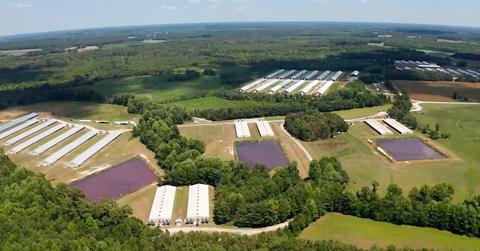Produced by Kate Mara, 'The Smell of Money' Doc Highlights Environmental Racism of the Pig Industry
Published May 3 2022, 3:26 p.m. ET
There are endless injustices within the pork industry, even going beyond the animal rights concerns and environmental damage. Those who live near pig farms and slaughterhouses have to deal with unthinkable pollution and health issues, and their stories highlight the plight of environmental racism in the U.S. — and the new documentary The Smell of Money aims to bring all of this to light.
“All the laws protect these industries, no one is protecting us,” activist Elsie Herring says in the film’s trailer.
Produced by actress and longtime vegan Kate Mara, The Smell of Money is a must-watch for anyone with a heart who wants to see things get better in the country — but especially for those who eat pigs and are unknowingly supporting this heartless and pollutive industry. Keep reading for the details on the documentary, as well as how to watch it.

A still of the late activist Elsie Herring in 'The Smell of Money.'
‘The Smell of Money’ documentary shows viewers how North Carolina’s hog farms are polluting the land and hurting locals.
The Smell of Money gives viewers an inside look at how the pork industry is hurting residents of eastern North Carolina, where there are about 35 pigs for every human, according to a piece The Smell of Money's producer and writer Jamie Berger wrote for Vox. In 2017, the state was home to about 9 million hogs and 2,400 hog farms, as per Scalawag Magazine. And these are not small family farms with red barns — they are primarily CAFOs (Concentrated Animal Feeding Operation) or factory farms.
The trailer touches upon just a few of the unjust things the pork industry does — namely, feces spraying. Because pigs produce so much waste, it is common practice for farmers to literally spray hog manure into nearby fields and streams, which pollutes the air, the ground, and waterways — and this pollution directly impacts nearby people. The trailer even mentions an instance in which pig feces spraying killed more than a billion wild fish within a week and a half.
According to Sierra Club, CAFOs emit more than 168 gases and hazardous chemicals, including hydrogen sulfide; hydrogen sulfide poisoning can cause a number of serious illnesses, including irreversible brain damage, headaches, nausea, sore throats, dizziness, and sinusitis.
And eastern North Carolina is home to high Black, Latinx, Indigenous, and immigrant populations, as Berger noted in her piece for Vox — highlighting how the factory farming industry perpetuates environmental racism and uses it to their advantage.
“Ain’t nobody helping us,” one woman says in the documentary, adding that no one seems to care about protecting her and her neighbors because they are Black and living in a rural area.
‘The Smell of Money’ chronicles a major lawsuit against the pork industry.
The documentary includes the firsthand personal stories of a number of locals, primarily Elsie Herring, who passed away in May 2021. Herring lived on land that her grandpa bought after claiming his freedom from slavery, and had dedicated much of her life to fighting the pork industry and the pollution it inflicts upon neighbors.
Specifically, she had been targeting the major pork producer Smithfield Foods since the 1990s, according to North Carolina Health News.
But around a decade ago, Herring had enough. She and her community teamed up with a lawyer to formally sue Smithfield Foods — and they spent nine years combatting the massive company and pork industry.
The documentary chronicles the team’s landmark lawsuit, in which “the residents risk everything to reclaim their rights to clean air, pure water, and a life free from the stench of s–t,” according to The Smell of Money’s website.
Kate Mara calls ‘The Smell of Money’ a “human activism” film.

Kate Mara executive produced 'The Smell of Money.'
Actress Kate Mara signed on as an Executive Producer for The Smell of Money after watching a rough cut of the film a few years ago.
“After watching the film, I couldn’t stop thinking about it,” she told Variety in a recent interview. “It’s a very haunting thing to learn about. I also felt this immense responsibility to the people (in the doc) and to their story. I wanted to work with Shawn [Bannon, the film’s director] to find a way to get their story out there because we want justice for them."
Though Mara herself is a passionate vegan (as are her sister Rooney Mara and Rooney’s husband Joaquin Phoenix), she doesn’t want to scare viewers away by framing The Smell of Money as “vegan activism film.” As she told Variety: “This is about human activism.”
Along with Mara, Shawn Bannon produced and directed; Jamie Berger produced and wrote; and David Lowery served as Executive Producer. The film also includes appearances from a few notable people, including Sen. Cory Booker of New Jersey, who is vegan.
How to watch ‘The Smell of Money’ documentary:
The Smell of Money made its world premiere at the Sarasota Film Festival in April 2022, where it won the Documentary Feature Jury Prize. It also played at the Hot Docs Festival later that month.
That said, the film is not yet available to the public, as of early May 2022. The team behind the film did not immediately respond to Green Matters’ request for details on the film’s release, but we will be sure to update this article when we have more details on how you can watch The Smell of Money.
